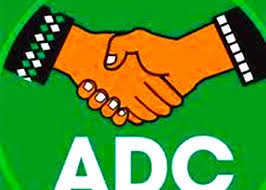ABUJA — The African Democratic Congress (ADC), recently unveiled as the face of a new opposition coalition ahead of the 2027 general elections, is now gripped by internal crisis and legal challenges threatening to derail its aspirations.
The turbulence within the party comes amid a fierce war of words between the ruling All Progressives Congress (APC) and opposition leaders over alleged attempts by President Bola Tinubu’s administration to destabilise the coalition by targeting northern ADC officials.
The rift within the ADC deepened *this week* as three aggrieved members approached the Federal High Court in Abuja, seeking to nullify the interim leadership of the party led by former Senate President, David Mark.
The plaintiffs, Adeyemi Emmanuel, Ayodeji Tolu, and Haruna Ismaila contended that the handover of the party’s structures to figures leading the new coalition violated the ADC’s constitution and an existing court judgment.
This internal litigation has thrown the party’s leadership into disarray just days after it was formally declared the political platform of a coalition that includes Labour Party’s 2023 presidential candidate Peter Obi, former Vice President Atiku Abubakar, and former governors, Nasir El-Rufai and Rotimi Amaechi.
The suit questioned the legitimacy of Mark’s leadership, that of former Osun Governor, Rauf Aregbesola (Secretary), and former APC spokesman Bolaji Abdullahi (publicity secretary), arguing that they were not registered members of the ADC at the time of their appointments and that interim leadership is not provided for under the party’s constitution.
The plaintiffs are asking the court to declare their appointments illegal, unconstitutional, and void.
The court case has exposed cracks within the newly-formed alliance, further complicated by the dissolution of existing state structures.
In Jigawa, former Deputy Governor, Ahmed Gumel was appointed as the new state coordinator of the ADC, following the resignation of the previous executive led by Kabiru Hussaini.
While Gumel called on Nigerians to support the coalition’s vision to reshape the country’s politics, the abrupt takeover in Jigawa and other northern states has fuelled accusations of imposition and confusion over the party’s actual leadership.
These developments coincided with an escalating confrontation between the APC and the ADC’s interim leadership.
In a strongly worded statement on Monday, ADC Publicity Secretary Bolaji Abdullahi accused the Federal Government of trying to sabotage the party by inviting its state leaders in the North East and North West to clandestine meetings aimed at coercion or defection.
“We have credible intelligence that the aim is not peace-building, but to sow confusion within the party, delegitimise its leadership, and derail its growing momentum,” Abdullahi said.
“This is a coordinated assault on multiparty democracy and a clear sign that the ruling party fears a united and credible opposition.”
However, the APC dismissed the allegations, accusing Abdullahi of impersonation.
The APC National Secretary, Ajibola Basiru, claimed the ADC must first regularise its leadership with the Independent National Electoral Commission (INEC) before making public declarations.
Echoing him, APC’s Director of Publicity, Bala Ibrahim, labelled Abdullahi a “habitual liar,” recalling his previous statement that being the APC spokesman was difficult because “you cannot do the job without lying.”
Ibrahim further ridiculed the coalition as “already in disarray,” claiming that even those who attended the unveiling event on July 1 did so under false pretences.
‘Some thought it was a PDP caucus meeting, some were misled, and many are not even leaving their parties. This coalition is built on deception,” he said.
The rising tensions come despite President Tinubu’s recent assurance, during his June 12 address to a joint session of the National Assembly, that Nigeria would not become a one-party state. Yet, the ADC insisted that actions by some of his appointees indicate otherwise.
“The president must rein in those working to turn Nigeria into a dictatorship,” Abdullahi said.
“If Goodluck Jonathan had been this intolerant, the APC wouldn’t have risen to power in 2015.”
Meanwhile, some observers argue that the ADC’s collapse into legal and leadership crises so soon after its unveiling as the coalition vehicle reflects deeper structural weaknesses and unresolved questions about party ownership, internal democracy, and strategic clarity.

